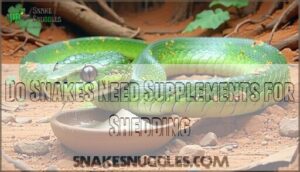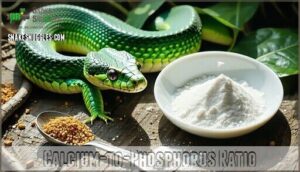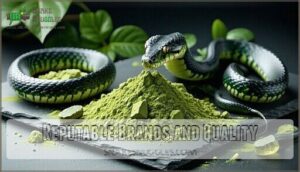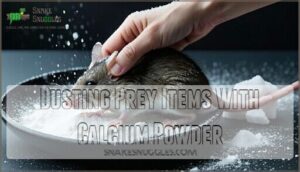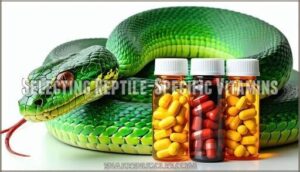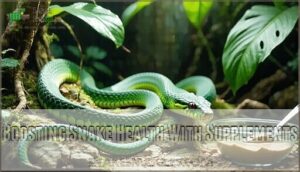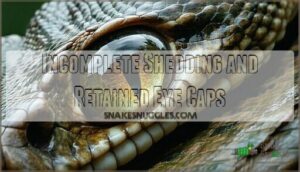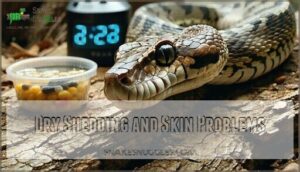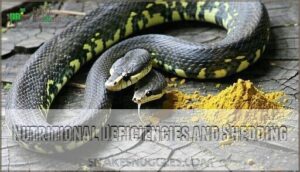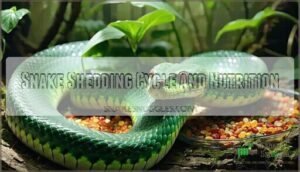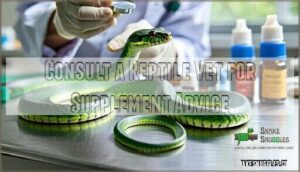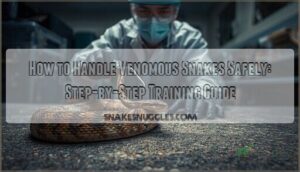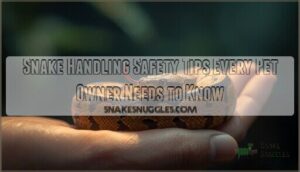This site is supported by our readers. We may earn a commission, at no cost to you, if you purchase through links.
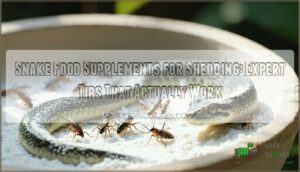
Dust your snake’s prey with quality calcium powder that maintains a proper calcium-to-phosphorus ratio—think 2:1 for ideal absorption.
Vitamin D3 helps your snake process calcium effectively, while trace minerals like zinc support healthy skin cell turnover.
Don’t go overboard though; over-supplementation can backfire faster than a startled ball python.
Most healthy snakes with proper husbandry shed fine without extras, but targeted supplementation can prevent those stubborn stuck sheds that make both you and your snake cranky.
The secret lies in understanding which nutrients actually matter during shedding cycles.
Table Of Contents
- Key Takeaways
- Importance of Supplements for Shedding
- Do Snakes Need Supplements for Shedding
- Choosing The Right Calcium Supplement
- Selecting Reptile-Specific Vitamins
- Feeding a Snake a Healthy Diet
- Environmental Factors Affecting Snake Nutrition
- Boosting Snake Health With Supplements
- Common Shedding Problems and Solutions
- Snake Shedding Cycle and Nutrition
- Consult a Reptile Vet for Supplement Advice
- Frequently Asked Questions (FAQs)
- How can I help my snake shed its skin?
- Should I give my snake supplements?
- How often should I use Repti shedding aid?
- Why won’t my snake eat while shedding?
- Do snakes need supplements?
- Do snakes eat sheds?
- Can snakes eat a fad diet?
- How do you feed a snake a healthy diet?
- How can I boost my snake’s health?
- How does the snake diet work?
- Conclusion
Key Takeaways
- You’ll need to focus on calcium powder with a 2:1 calcium-to-phosphorus ratio, vitamin D3, and trace minerals like zinc to support healthy shedding cycles—dust your snake’s prey lightly before feeding rather than overdoing it.
- Don’t expect supplements to fix poor husbandry; you must maintain proper humidity levels (50-60%), temperature gradients, and UVB lighting first since 90% of shedding problems stem from inadequate nutrition combined with environmental issues.
- You should feed juveniles calcium-dusted prey weekly and adults every two weeks, but watch for over-supplementation signs like tremors or kidney problems—most healthy snakes with proper care shed fine without extras.
- You can’t just guess at your snake’s supplement needs; consult a reptile vet for species-specific recommendations and monitor your pet’s weight, shed quality, and behavior to adjust supplementation as needed.
Importance of Supplements for Shedding
When your snake’s struggling with patchy, incomplete sheds that look like a bad sunburn peel, the problem often traces back to missing nutrients in their diet.
You can’t just hope for perfect shedding cycles without giving your snake’s body the right building blocks, especially calcium, vitamin D3, and trace minerals that work together like a well-oiled machine during the demanding shedding process.
Your snake’s shed is only as good as the nutrients you provide – no shortcuts, no excuses.
Role of Calcium and Phosphorus
Behind every successful shed lies proper calcium absorption and the right supplement ratios.
Your snake’s bone development depends on maintaining dietary balance, and getting the calcium-phosphorus ratio wrong can spell trouble.
Here’s your game plan for bulletproof bone health:
- Dust prey with calcium powder before feeding
- Target a 2:1 calcium-phosphorus ratio for ideal absorption
- Choose reputable supplements to avoid quality issues
- Gut-load prey with calcium-rich foods beforehand
- Watch for weakness or tremors indicating calcium deficiency
Getting these phosphorus sources balanced prevents metabolic bone disease while supporting healthy shedding cycles.
Vitamin D3 and UVB Lighting
Vitamin D3 acts like your snake’s personal sunshine vitamin, turning UVB lighting into calcium-absorbing power.
Without proper UVB Benefits and D3 Synthesis, even the best reptile supplements fall flat during reptile shedding.
Quality UVB lighting beats guesswork every time.
| Lighting Factor | Optimal Range | Shedding Impact |
|---|---|---|
| Lighting Spectrum | 290-320 nm UVB | Healthy skin renewal |
| Distance Matters | 6-12 inches | Proper D3 production |
| Daily Exposure | 10-12 hours | Consistent snake supplements effectiveness |
| Over-Supplementation Risks | Monitor carefully | Prevents tissue calcification |
Trace Minerals and Their Functions
Think of trace minerals as your snake’s nutritional sidekicks – they’re tiny but mighty helpers that keep everything running smoothly.
These essential nutrients power enzyme activation and metabolic processes while providing vital immune support during shedding cycles.
Without proper mineral absorption, your snake might struggle with growth regulation and face nutritional deficiencies that affect shed quality.
Here’s how trace mineral supplements boost your snake’s health:
- Strengthen immune function during vulnerable shedding periods
- Activate key enzymes needed for healthy skin renewal
- Support metabolic processes that fuel proper growth
- Enhance mineral absorption from snake food supplements
Do Snakes Need Supplements for Shedding
You’ll know your snake needs supplements when you spot the telltale signs: tremors, muscle weakness, or that dreaded incomplete shed that makes you wonder if you’re feeding your pet properly.
Your snake’s trembling body and patchy shed are screaming for the nutrients you’ve been skipping.
While a balanced diet of whole prey usually covers the basics, deficiencies in calcium, vitamin D3, or trace minerals can turn shedding from a natural process into a frustrating health challenge, particularly when it leads to an incomplete shed.
Signs of Calcium Deficiency
Calcium deficiency sneaks up on snake owners like a thief in the night.
Watch for tremors that shake your snake’s body—these tremor signs often appear first.
Muscle weakness follows, making your pet sluggish and unresponsive. You’ll notice lethargy observed during feeding times and handling sessions.
Slow growth becomes obvious when comparing your snake to growth charts. Bone brittleness develops silently, creating fracture risks.
These nutritional deficiencies directly impact bone health and shedding quality. Snake food supplements containing calcium can reverse these symptoms before they become life-threatening veterinary emergencies.
Vitamin D3 Deficiency Symptoms
When your snake lacks vitamin D3, you’ll spot telltale signs that scream trouble.
Bone weakness develops first, followed by muscle tremors and slow growth that’s hard to miss.
Lethargy signs become obvious—your snake moves like it’s stuck in molasses.
Without proper snake food supplements, vitamin D3 deficiency can escalate to serious kidney damage. Don’t wait.
Effects of Trace Mineral Deficiencies
Your snake’s health can spiral when trace minerals go missing.
Nutritional deficiencies trigger shedding complications, stunted bone development, and immune suppression.
You’ll spot neurological issues like tremors and poor coordination.
Organ function deteriorates, affecting digestion and metabolism.
Trace mineral supplements prevent these shedding problems before they wreck your pet’s wellbeing. Snake shedding supplements keep everything running smoothly.
Choosing The Right Calcium Supplement
You can’t just grab any calcium powder from the reptile store and call it a day, since the wrong supplement can actually harm your snake’s shedding process.
The key is finding a high-quality product with the proper 2:1 calcium-to-phosphorus ratio that you’ll dust onto prey items before feeding.
Calcium-to-Phosphorus Ratio
Getting the calciumphosphorus ratio right makes all the difference for healthy shedding.
Your Ideal Ratio should hit 2:1 calcium to phosphorus—think of it as your snake’s nutritional sweet spot.
Most snake food for shedding naturally contains phosphorus, so you’ll need calcium carbonate supplements to balance things out.
Many owners purchase snake calcium supplements online.
Watch for Deficiency Signs like soft bones or poor sheds, but don’t go overboard.
Over-Supplementation Risks include kidney problems and blocked nutrient absorption.
Supplement Forms like powder work best, while whole prey provides decent Dietary Sources for phosphorus.
Reputable Brands and Quality
Quality matters when you’re shopping for calcium supplements – your snake’s health depends on it.
Here’s how to spot the good stuff:
- Brand Transparency: Look for companies that list exact ingredient amounts and sources, like EarthProShedSupport’s detailed formulations
- Manufacturing Practices: Choose brands with GMP certification and third-party supplement testing
- Vet Recommendations: Ask your reptile vet which reputable brands they trust for snake skin supplements.
Many owners buy EarthPro ShedSupport products for their snakes.
Dusting Prey Items With Calcium Powder
Dusting prey items with calcium powder requires finesse – think light snowfall, not blizzard coverage.
Shake frozen mice in a bag with powder for even coating.
Feed juveniles dusted prey weekly, adults bi-weekly to prevent supplement overdose.
This powder application method guarantees proper calcium absorption while avoiding the frequency debate.
You can find the right snake supplement online.
Your snake’s reptile nutrition depends on balanced vitamin supplements, not excessive dosing.
Selecting Reptile-Specific Vitamins
You’ll find that reptile-specific vitamins aren’t just fancy marketing—they’re formulated with the exact ratios your snake needs to shed properly.
Unlike generic pet vitamins that might do more harm than good, reptile-specific vitamins are a crucial choice for your pet’s health.
Think of it like buying prescription glasses instead of reading glasses from the gas station; both might look similar, but only one actually fits your specific needs.
Vitamin a and Beta Carotene
Vitamin A serves as your snake’s skin and vision guardian, but here’s the catch – too much becomes toxic fast.
Beta carotene conversion offers a safer path since your snake’s body converts only what it needs. Think of beta carotene as vitamin A’s smart cousin who knows when to stop.
For skin health and vision support, focus on beta carotene-rich sources rather than preformed vitamin A supplements.
Supplement safety matters because Vitamin A toxicity causes serious health issues. When planning your snake diet, remember that reptile vitamins containing beta carotene support healthy snake shedding cycles without the overdose risks that preformed vitamin A presents.
Trace Mineral Supplements
Several trace minerals work behind the scenes to perfect your snake’s shedding process.
These microscopic nutrients boost mineral absorption and support cellular functions that create smooth, complete sheds.
- Zinc deficiency causes brittle scales and incomplete shedding cycles
- Selenium shortage disrupts hormone production affecting skin renewal
- Copper deficiency leads to dry, cracked skin that won’t shed properly
- Iron deficiency reduces energy for cellular growth during shedding
Quality supplement sources like Rep-Cal provide balanced mineral interactions for ideal supplement effectiveness.
Feeding a Snake a Healthy Diet
You can’t just toss any rodent into your snake’s enclosure and call it a balanced meal – proper nutrition starts with choosing the right prey size, type, and preparation methods.
Think of it like meal planning for a very particular dinner guest who only eats once a week and has zero tolerance for nutritional shortcuts, which requires balanced consideration.
Prey Size and Type Selection
Nailing the right prey size matters more than you’d think for healthy shedding.
Choose frozen vs. live based on your comfort level—both work fine.
The appropriate size should match your snake’s thickest point, never bigger.
Nutritional content stays consistent when you source from reputable suppliers practicing ethical sourcing.
Your snake diet for shedding depends on getting sizing right first.
Variety in Prey Selection
Getting the prey size right is only half the battle.
Your snake’s shedding success depends on nutritional diversity through varied prey selection. Think of it like a balanced human diet – you wouldn’t eat only chicken every day.
Mix up your snake’s menu with these novel prey items:
- Mice and rats for calcium-rich nutrition
- Quail or chicks for vitamin variety
- Fish for omega fatty acids
- Different rodent species for mineral balance
Gut-Loading Prey for Nutritional Boost
Beyond choosing the right prey size, you need to gutload prey with calcium-rich feeds before feeding.
Load crickets and rodents with leafy greens, carrots, and commercial gut-loading diets 24-72 hours beforehand.
This transforms nutritionally empty prey gut content into powerhouses of vitamins and minerals.
Proper hydration importance during gut-loading methods guarantees maximum supplement absorption for ideal snake nutrition and smooth snake shedding.
Environmental Factors Affecting Snake Nutrition
Your snake’s environment acts like a master chef controlling how well it digests food and absorbs nutrients, with temperature, humidity, and lighting working together to either boost or block proper nutrition.
Think of it this way: even the best supplements won’t help if your snake’s living conditions aren’t supporting its body’s ability to process and use those nutrients effectively.
Temperature and Digestion Relationship
Your snake’s digestion rate depends entirely on optimal temperature—too cold, and food sits like a rock in their stomach.
Enzyme activity kicks into high gear when temps hit the sweet spot, boosting metabolic rate naturally.
Watch their basking behavior for clues about comfort levels.
Poor environmental conditions slow digestion, potentially causing shedding problems down the line.
Humidity Impact on Hydration
Maintaining proper humidity levels acts like your snake’s personal spa treatment for healthy hydration.
When environmental conditions aren’t right, you’ll spot dehydration fast—wrinkled skin that doesn’t bounce back when gently pinched. Different species need different humidity ranges, so don’t treat them all the same.
Here’s your humidity checklist for shedding success:
- Keep water bowl filled and sized appropriately for your species
- Monitor humidity with a reliable hygrometer daily
- Mist enclosure 1-2 times daily during shedding cycles
- Provide humid hides with damp sphagnum moss
- Adjust water availability based on species differences
Perfect humidity prevents those frustrating stuck sheds.
Lighting and Vitamin D3 Synthesis
While humidity keeps your snake’s skin supple, UVB lighting acts like nature’s vitamin factory.
Your snake’s skin converts UVB rays into vitamin D3, which helps calcium absorption during shedding.
Without proper reptile lighting, you’ll see calcium deficiency symptoms like weak bones and poor sheds.
| UVB Spectrum | Lighting Distance | Supplement Timing |
|---|---|---|
| 290-320nm range | 6-12 inches away | Reduce during UVB exposure |
| 10-12% output | Measure with UV meter | Monitor basking behavior |
| Replace every 6 months | Adjust for enclosure height | Watch for D3 overdose signs |
Think of UVB as your snake’s personal reptile shedding aid – it builds healthy skin from within.
Boosting Snake Health With Supplements
You can’t expect your snake to shed properly if you’re skipping the nutritional basics, like trying to run a car on empty.
Strategic supplementation with calcium, vitamin D3, and trace minerals fills critical gaps in your snake’s diet, ensuring their skin comes off cleanly instead of sticking around like yesterday’s bandage, which is made possible by proper nutrition.
Calcium Supplementation
With proper environmental conditions in place, your snake’s calcium needs become the foundation for healthy sheds.
Getting calcium supplementation right prevents deficiency issues that lead to poor shedding and bone health problems.
Here’s your calcium game plan:
- Choose quality calcium powder with proper ratios for ideal D3 absorption
- Dust prey lightly – juvenile supplementation requires more frequent application than adults
- Monitor for calcium deficiency signs like tremors or weak bones
- Consider gut-loading benefits by feeding calcium-rich foods to prey beforehand
- Avoid supplement overdose which causes more harm than good with reptile vitamin supplements
Vitamin D3 Supplementation
Vitamin D3 works like calcium’s best friend, helping your snake absorb nutrients for smooth shedding.
If you can’t provide UVB lighting, supplements become your UVB alternative.
Watch out for D3 toxicity—too much causes soft tissue calcification.
Stick to safe dosage guidelines: juveniles get calcium with D3 weekly, adults twice monthly.
D3 overdose isn’t worth the risk.
Trace Mineral Supplementation
Beyond calcium and vitamin D3, trace minerals act like tiny building blocks for your snake’s health. These micronutrients support proper shedding and overall well-being.
Here’s your essential shedding supplement guide:
- Mineral absorption improves with quality mineral powder formulations
- Watch for deficiency signs like poor shed quality or lethargy
- Avoid supplement overdose by following dosage instructions precisely
- Consider bioavailability when choosing reputable trace mineral products
Common Shedding Problems and Solutions
When your snake’s shed looks more like confetti than a single piece, you’re dealing with dysecdysis—the fancy term for incomplete shedding that’s usually caused by low humidity, poor nutrition, or underlying health issues.
Don’t just treat the stuck skin; you’ll need to identify and fix the root cause, whether it’s cranking up that humidity level or boosting their diet with the right supplements to address issues like low humidity.
Incomplete Shedding and Retained Eye Caps
You’ll notice dysecdysis causes stem from poor husbandry—low humidity, inadequate nutrition, or illness.
Retained eyecaps need immediate vet intervention; don’t attempt removal yourself.
For shedding assistance, create a humid hide and gently soak your snake in lukewarm water.
Preventative measures include maintaining proper humidity levels and following a solid supplement plan.
This shedding problem solution addresses root causes, not just symptoms.
Your shedding supplement guide should prioritize calcium and B vitamins for healthy molts.
Dry Shedding and Skin Problems
When your snake’s skin looks like cracked leather, dry shedding has entered the chat. Shedding problems often stem from shedding difficulty causes like low humidity level impact and poor nutrition. Retained skin patches aren’t just unsightly—they’re warning signs your snake skin health needs attention.
Here’s your action plan for snake shedding success:
- Bump up humidity to species-specific levels using a reliable hygrometer
- Add a soaking bowl large enough for your snake’s body
- Install a humid hide with damp sphagnum moss
- Monitor skin elasticity by gently pinching loose skin
- Consider supplementation strategies** with vitamin A-rich options
Veterinary intervention signs include persistent retained patches despite proper care.
Nutritional Deficiencies and Shedding
Poor snake nutrition creates a domino effect during shedding cycles.
Vitamin A deficiency triggers hyperkeratosis, making skin thick and stubborn like old leather.
B vitamin impact shows through neurological tremors, preventing snakes from rubbing properly against surfaces.
Mineral deficiency signs include brittle bones and muscle weakness.
The hydration shedding link can’t be ignored—dehydrated snakes develop wrinkled, inflexible skin.
Shedding nutrient loss demands vitamin supplements and trace minerals to restore nutrient absorption for healthy molting.
Snake Shedding Cycle and Nutrition
Your snake’s shedding cycle demands specific nutrients at precise times, just like how you need extra vitamins when you’re fighting off a cold.
Understanding when to boost calcium, B vitamins, and trace minerals during the pre-shed, active shedding, and recovery phases transforms problematic sheds into smooth, complete skin changes.
This understanding keeps your snake healthy and stress-free, ensuring that the shedding process is as natural and effortless as possible.
Frequency of Shedding
Understanding your snake’s shedding frequency helps you spot health changes early.
Juvenile snakes shed every 4-6 weeks during rapid growth phases, while adult snakes typically shed 2-4 times yearly.
Species differences matter—ball pythons shed less frequently than corn snakes.
Age influence, diet impact, and environmental factors all affect this natural cycle, making regular monitoring essential for proper care.
Pre-Shedding Behavior and Care
Like a snake preparing for a wardrobe change, your reptile will show clear preshedding behavior signals. You’ll notice increased hiding, reduced appetite, and color dullness as their skin becomes milky. Their eyes turn cloudy, signaling the shedding process has begun.
Support them by boosting humidity levels to 60-70% and offering foods rich in vitamin A and omega3 fatty acids. Practice gentle handling during this sensitive time—think of it as respecting their "do not disturb" sign while they prepare for their spectacular transformation.
- Monitor temperature and humidity closely
- Provide extra hiding spots for comfort
- Avoid unnecessary handling during this phase
Post-Shedding Care and Nutrition
After watching your snake successfully complete its shed, you’ll want to focus on recovery nutrition and care. Start with hydration assessment by gently checking skin elasticity – healthy snakes bounce back quickly.
Post-shed feeding should begin 2-3 days after completion with appropriately sized prey. Your supplement plan needs adjustment during this recovery phase. Continued supplementation with calcium and vitamins supports new skin development.
A balanced diet becomes even more important now. The key to a successful recovery is monitoring your snake’s health and adjusting its care accordingly.
| Recovery Phase | Care Actions | Nutritional Focus |
|---|---|---|
| Days 1-2 | Enclosure cleaning, fresh water | Hydration monitoring |
| Days 3-4 | Resume feeding schedule | Calcium-dusted prey |
| Week 1 | Monitor appetite return | Regular supplement routine |
| Week 2+ | Normal husbandry | Maintain nutritional information tracking |
Postshedding care sets the foundation for your snake’s next successful shedding cycle, ensuring a healthy and thriving pet through proper care and nutrition.
Consult a Reptile Vet for Supplement Advice
Your snake’s supplement needs aren’t one-size-fits-all, and even experienced keepers can benefit from a vet’s trained eye to spot what they might miss.
A reptile veterinarian can create a customized supplement plan based on your snake’s species, age, health history, and current diet, which beats the guessing game every time.
Snake Supplement Vet Consultation Introduction
Your snake’s supplement needs aren’t one-size-fits-all, and even experienced keepers can benefit from a vet’s trained eye to spot what they might miss.
A reptile veterinarian can create a customized supplement plan based on your snake’s species, age, health history, and current diet, which beats the guessing game every time.
Importance of Regular Check-Ups
Your snake’s health story unfolds clearly when a reptile veterinarian examines them regularly.
These checkups catch problems before they snowball into serious issues that’ll cost you time, money, and heartache.
Regular checkups with your reptile vet provide thorough health monitoring:
- Early detection of nutritional gaps through blood work and physical exams
- Parasite screening to identify hidden threats affecting nutrient absorption
- Weight monitoring and growth tracking to confirm proper development
- Husbandry review of your setup, feeding schedule, and supplement plan.
Preventative care beats emergency visits every time.
Your reptile veterinarian’s trained eye spots subtle changes you’d miss, keeping your snake healthy year-round.
Customized Supplement Recommendations
Your reptile vet can tailor customized supplement recommendations based on your snake’s species-specific needs and age-based dosing requirements.
They’ll assess health condition impact and identify potential supplement interaction risks while developing a thorough dietary integration strategy.
Professional guidance guarantees your reptile shedding support plan actually works for shedding success.
Monitoring Snake Health and Adjusting Supplements
After getting customized supplement recommendations from your reptile vet, you’ll need to watch your snake like a hawk for changes.
Hydration Assessment through Skin Elasticity tests and tracking Behavioral Changes helps catch Supplement Overdose early. If shedding problems persist despite following your reptile vet’s advice, don’t hesitate to schedule another Vet Consultation.
Here are three key monitoring strategies:
- Weekly weight checks using a digital scale
- Monthly shed quality assessments for completeness
- Daily appetite and activity observations
This ongoing reptile shedding support guarantees your snake health and shedding stays at its best.
Frequently Asked Questions (FAQs)
How can I help my snake shed its skin?
Humidity rises, temperatures stabilize, and rough surfaces await—you’ll create the perfect shedding environment.
Maintain 50-60% humidity, provide lukewarm soaks, and offer textured branches.
Never pull stuck skin; let proper conditions work their magic naturally.
Should I give my snake supplements?
Yes, you should give your snake supplements, but don’t go overboard.
Dust prey with calcium powder regularly, add multivitamins once weekly, and consider specialized shedding support during problem sheds.
Balance beats excess every time.
How often should I use Repti shedding aid?
Use commercial shedding aids only when your snake shows pre-shed signs like cloudy eyes or dull skin.
Apply once during the shed cycle, then stop.
Don’t use routinely – fix underlying humidity issues instead.
Why won’t my snake eat while shedding?
Like a hermit crab preparing for its big move, your snake’s appetite hits pause during shedding.
Their vision’s blurry, they’re vulnerable, and instincts say "hide, don’t hunt."
It’s completely normal—they’ll bounce back post-shed, and this behavior is a natural part of their cycle, triggered by the shedding process.
Do snakes need supplements?
Most snakes don’t need supplements if you’re feeding whole prey items regularly.
However, calcium powder dusting and occasional multivitamins can help fill nutritional gaps, especially for growing juveniles or breeding adults.
Do snakes eat sheds?
Nature’s recycling program kicks in when your slithery friend sheds—they’ll often munch their old skin like potato chips.
It’s perfectly normal behavior that provides nutrients and removes evidence from potential predators lurking nearby, which is a result of Nature’s recycling program.
Can snakes eat a fad diet?
No, you shouldn’t put your snake on trendy diets.
These reptiles need consistent, species-appropriate whole prey meals.
Fad diets lack essential nutrients, disrupt their digestive system, and can cause serious health problems or death.
They require a balanced diet to thrive, and species-appropriate care is crucial for their well-being.
How do you feed a snake a healthy diet?
Wild snakes thrive on diverse prey, yet 85% of captive feeding problems stem from monotonous diets.
You’ll feed whole prey items sized appropriately—think mouse width matching your snake’s thickest body section.
Dust with calcium supplements biweekly for peak health.
How can I boost my snake’s health?
You’ll boost your snake’s health by maintaining proper temperature gradients.
Monitoring humidity levels with a hygrometer, providing fresh water, are essential for the snake’s well-being.
Dusting prey with calcium supplements, and ensuring adequate UVB lighting for ideal nutrition, are also crucial for the snake’s health.
How does the snake diet work?
Your snake’s diet centers on whole prey items sized appropriately for their body.
Feed juveniles weekly, adults every 10-14 days.
Dust prey with calcium supplements and make certain fresh water’s always available for healthy well-being.
Conclusion
Approximately 90% of shedding problems stem from inadequate nutrition rather than environmental factors alone.
Smart snake food supplements for shedding can bridge these nutritional gaps when you’ve got your husbandry dialed in correctly. Remember, you’re not fixing poor care with powder—you’re optimizing already solid fundamentals.
Stick to calcium, vitamin D3, and essential trace minerals while avoiding the supplement aisle temptation to overdo things. Your snake’s perfect shed starts with targeted nutrition, not wishful thinking, and is based on solid fundamentals.

